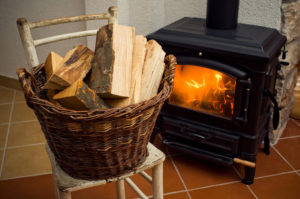If you’re in the market for a new fire appliance, a stove may be just the choice for you. Stoves are popular for their variety in size, style, and freedom of installation. We can put a stove in any space, big or small. We can use refractory materials to install a stove in a tight corner, in the middle of a room, or even put a stove in an existing masonry hearth. No matter what your décor or your style is like, we can fit you with a stove that matches you and your home perfectly. Stoves come in traditional styles reminiscent of cast iron potbelly stoves and contemporary styles, sleek and minimalist. Once you choose what style stove you’d like to have, you can figure out which fuel type will suit you best.
 Fuel Types and Availability
Fuel Types and Availability
It’s important to choose your fireplace fuel type wisely. It can be expensive to convert from one fuel to the other, and it’s always best to make the best choice first. A new stove will be a lifelong investment in your home. Having a stove is about adding ambiance and comfort to your living space, supplementing your heat, and bringing value to your property. Don’t make a decision you’ll regret. Make sure you let a trusted professional lead you through this process. At Chesapeake Chimney and Co., we sell and install fire appliances that come in wood, pellets, and gas.
- Wood – We recommend wood fires for our customers who have a readily-accessibly supply of wood. Maybe they have a forest on their property or a local firewood supply nearby. You might only want a wood stove if you have access to firewood as well as a place to store it. If you purchase firewood from a local supplier, make sure it’s properly seasoned [https://woodheat.org/firewood.html] and that you’re getting what you paid for.
- Pellets – If you don’t have access to wood or you’re just not interested in cutting, splitting, carrying, and lighting firewood, pellets may be best for your home. A pellet stove burns only pellets, a product made of recycled wood byproducts that are sold to burn in these units. Pellets must be purchased, but can be stockpiled during the off-season when costs are low. If you depend on a pellet stove, running out of pellets may mean some cool nights. Make sure you purchase and store enough to get through the winter.
- Gas – If space is limited and you have no room for wood or pellets, gas is the best option for you. Gas is piped into apartments, condos, and city houses by gas companies. If you live in the country, you may not have access to natural gas. If this is the case, then a gas stove is not an option for you. These units are designed to work in conjunction with a gas line that is maintained by a gas company. Make sure you are not attempting to burn other fuels in a gas stove.
Benefits of Wood, Pellets, and Gas
Once you figure out which fuel-types are possible for you, the next determining factor is which one offers the most benefits for your home and family.
- Efficiency – Wood stoves are more efficient than ever, but they are still not more efficient than pellet or gas stoves. Natural gas is the cleanest burning fuel on the market, but they do not produce as much sustained heat as wood fires. The design of the stove plays a big part in how our fuel type burns, but wood is the least efficient fuel type, followed by pellets. Pellets burn more efficiently than wood, and many homeowners even qualify for a tax credit when they trash an old wood stove and get a pellet stove.
- Convenience – The fact is that wood stoves are not convenient. They are loved for their high heat output, their beautiful flames, and ambiance. If you’re looking for convenience, you need to consider a gas or pellet stove. Gas stoves are easy to install and maintain. They ignite with the push of a button (or even a switch) and the flame and temperature are controlled precisely with a knob. Pellet stoves are more convenient because they have an ignitor that starts the fire as well as a hopper that continuously feeds the fire to maintain a consistent temperature.
- Low-Maintenance – The more efficient your stove, the less maintenance it requires. Your fire appliance needs a chimney sweep and inspection annually. When wood burns, creosote, and soot are produced and pushed up the chimney. These materials will need to be removed annually or performance will suffer. Pellets burn cleaner, so less creosote is produced, but the flue system will still need to be cleaned regularly. In fact, even the cleanest-burning fuel type will need to be serviced annually.
If you’re looking to add a new stove to your home, the possibilities are nearly endless. A Chesapeake Chimney & Co. professional can help you determine what is best. We sell and install gas, wood, and pellet stoves year-round so that when it’s time for burn season, you can burn the best fuel for your family.
Call a Chesapeake Chimney expert today at 410-535-0052.

Recent Comments